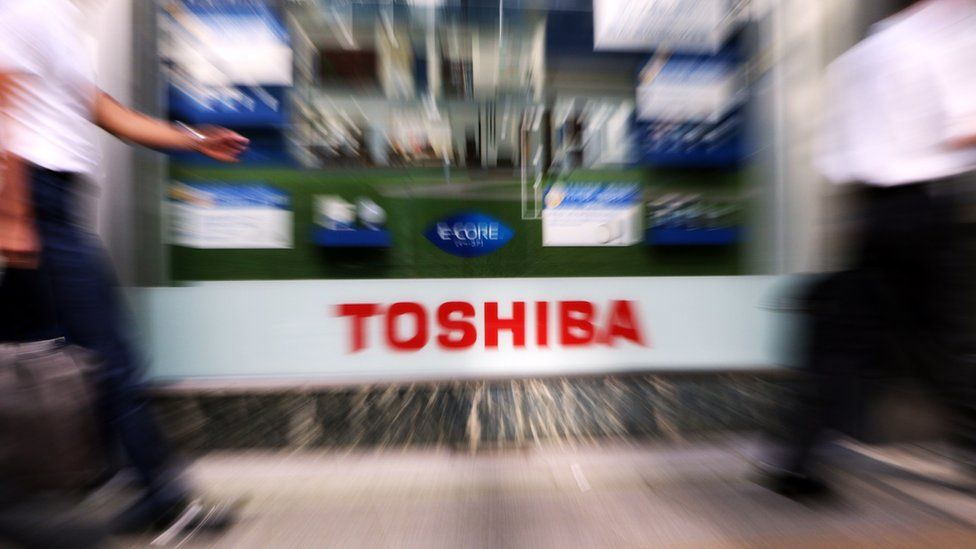Toshiba's Westinghouse files for US bankruptcy
- Published

Westinghouse, Toshiba's US nuclear unit, has filed for US bankruptcy protection.
The US firm has struggled with hefty losses that have thrown its Japanese parent into a crisis, putting the conglomerate's future at risk.
Westinghouse has suffered huge cost overruns at two US projects in Georgia and South Carolina.
Toshiba said the bankruptcy would not affect Westinghouse's UK operation, which employs more than 1,000 workers.
However, the firm warned, external that the writedown of its US nuclear business could see Toshiba's total losses last year exceed 1 trillion yen ($9.1bn; £7.3bn), almost triple its previous estimate.
The Japanese government confirmed on Wednesday that it was aware of Toshiba's plans.
Toshiba President Satoshi Tsunakawa said the move was aimed at "shutting out risks from the overseas nuclear business."
"We want to make this our first step toward recovering our solid business," he said.
What went wrong?
Toshiba initially alerted investors in December 2016 that it faced heavy losses linked to a deal done by Westinghouse.
Assets that it took on are likely to be worth less than initially thought and there is also a dispute about payments that are due.
As a consequence, Toshiba initially hoped to sell its majority stake in Westinghouse.
A Westinghouse plant in Waynesboro, in the US
The Japanese company was also twice given permission to delay reporting its earnings until 11 April.
The nuclear services business brings in about one-third of the industrial giant's revenue.
Toshiba says it expects a 712.5bn-yen ($6.3bn; £5bn) writedown because some of its US nuclear assets were worth far less than estimated.
Will it help Toshiba?
A Westinghouse bankruptcy filing should help limit future losses for Toshiba.
The difficulties at Westinghouse have sent Toshiba shares into freefall, losing more than 50% since the company first unveiled the problems in December 2016.
In February, the company's chairman stepped down and the firm delayed publishing its results over disagreements with its auditors.
Mr Shiga stepped down "to take management responsibility for the loss"
The financial problems have some analysts speculating over whether the Japanese conglomerate can even survive the crisis, as it will probably be forced to sell many of its premium segments, such as the lucrative memory chip unit.
So while a Westinghouse bankruptcy might stop things from getting even worse for Toshiba, it is still not clear whether the struggling giant will manage to find its feet in time.
The Japanese government is unlikely to allow Toshiba to collapse, given its large workforce and its importance to the nuclear industry, said Amir Anvarzadeh, an analyst at BGC Partners.
But with its nuclear problems, "the question is whether the rest of the business will be big enough to service its debt," he said.
Analysis: Theo Leggett, BBC business reporter
Westinghouse is long established engineering company which constructed the United States' first commercial nuclear reactor in the 1950s.
It still provides technology for nuclear power stations around the world.
However, massive cost over-runs at power station projects in South Carolina and Georgia, as well as heavy losses linked to the takeover of another nuclear business in 2015, have brought it to the brink of collapse.
The bankruptcy filing will allow the company to continue operating while it renegotiates contracts and holds talks with its creditors.
UK plant in limbo
Toshiba said that only Westinghouse's US operations, external would be affected by the bankruptcy.
Its European business, including the UK, as well as its Asian, Middle East and African operations would see no impact, helped by the firm securing $800m (£650m) of extra financing, Toshiba said.
However, the bankruptcy could still have far-reaching consequences for the UK's future nuclear plans.
The Moorside nuclear plant on the Cumbrian coast is due to open in the mid-2020s
Toshiba has a 60% stake in NuGen, a joint venture with France's Engie, which has the contract to build a new nuclear power plant in Cumbria in the UK.
As part of Toshiba, Westinghouse was due to build the reactors for the new plant. A collapse of the firm could delay the project or even put its future in limbo.
It is estimated that the Moorside plant would eventually provide as much as 7% of the UK's energy needs.
NuGen said in a statement that it "will continue in a 'business as usual' manner" to get permits and licences for the project, and "will continue to increase value and attractiveness of the project to potential future investors".
It added that it "cannot comment on specific financial issues relating directly to Toshiba or Westinghouse".
Last month, Toshiba said it would continue to work on the development of Moorside, but would not be involved in its construction.
A Toshiba spokeswoman said on Wednesday that it was "assessing the feasibility of the project, but at the moment, nothing is decided".
Toshiba said: "The Chapter 11 filings have made planned supply of the AP1000 [nuclear reactors] for the UK project uncertain, and we have therefore recorded an impairment loss covering the cost of the NuGen project.
"However, if you consider the project in terms of the overall power generation business, there is no change in the business climate."
- Published14 March 2017
- Published29 March 2017
- Published14 February 2017